You know how some people get excited about the longest word in the world? Well, Filipino curse words might not win any length contests, but they definitely win at making an impression. Trust me on this one.
I'm talking about "mga mura" or those Tagalog swear words you'll never find in your language learning app but absolutely will hear the moment you step into Manila traffic. Whether you're trying to understand what your Filipino friends are muttering under their breath or just want to sound less like a walking textbook, here are 30+ curse words and phrases that'll give you serious street cred.
- 12 Japanese Anime for Kids That'll Help You Learn Japanese
- Basic Guide to Commands in Spanish: Forms and Examples
- 10+ Best Resources To Study Turkish Effectively

Why Learn Filipino Swear Words?
As a Filipino, I believe learning our swear words can teach you a lot about our language and culture. These words reveal our history and what we value as a society, and each curse word has its own unique story, much like other deep Filipino words.
In fact, many of our swear words come from Spanish and English, showing how these languages have shaped our own. But we also have unique swear words that stem from our religious background and formal way of speaking, giving our language its special flavor.
Understanding these words helps you grasp Filipino conversations better, whether you’re listening to corny Filipino jokes or watching our Tagalog movies with friends. It’s not about using the words yourself - that’s definitely not the goal. Rather, it’s about truly understanding what’s being said and feeling more connected to our culture.
I’ve personally seen how this knowledge helps non-native speakers avoid awkward situations where they might use a word wrong. More importantly, it helps them understand why we communicate the way we do. It’s like having a special insight into how we Filipinos think and express ourselves.

Most Common Tagalog Swear Words
Putang Ina Mo
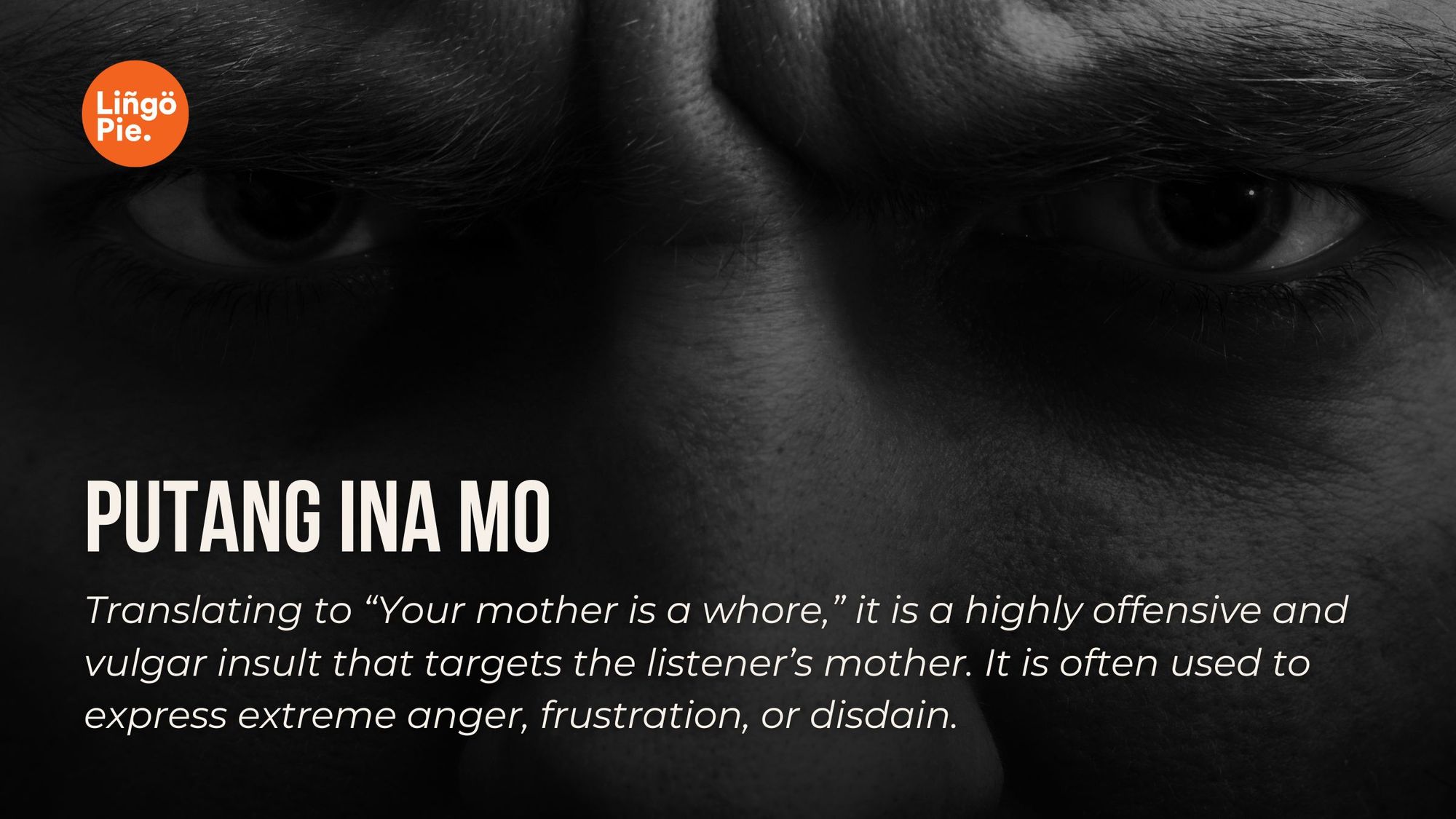
“Putang Ina Mo” is a widely recognized Tagalog swear phrase in the Philippines, often shortened to 'ina mo' in casual speech. Translating to “Your mother is a whore,” it is a highly offensive and vulgar insult that targets the listener’s mother. It is often used to express extreme anger, frustration, or disdain.
Due to its strong derogatory nature, it is advised to avoid using this phrase in any context, especially around native speakers or in public settings.
Walang Hiya Ka

“Walang Hiya Ka” is a common Tagalog phrase that translates to “You have no shame” or “You’re shameless.” This insult is used to express strong disapproval or anger towards someone perceived as behaving disrespectfully, rudely, or immorally, essentially calling them 'walang hiya'.
Sounds a bit wordy, right? Let me breakdown this Tagalog curse word so you’ll understand it better.
- The phrase “Walang Hiya” directly means “no shame”
- Adding “ka” makes it personal, targeting the individual
Bwisit Ka

Bwisit Ka” or “Buwisit” is a Tagalog expression used to convey annoyance, frustration, or anger. Translating roughly to “You’re a nuisance” or “You bring bad luck,” it is often used to describe someone or something that causes irritation or misfortune.
The term “Buwisit” alone can refer to anything unpleasant or troublesome, while adding “Ka” makes it a direct insult towards a person. More importantly, remember that this phrase is commonly used in everyday Filipino conversations, which is why sometimes this is used as a jokingly banter among friends, much like other swear words.
Tanga
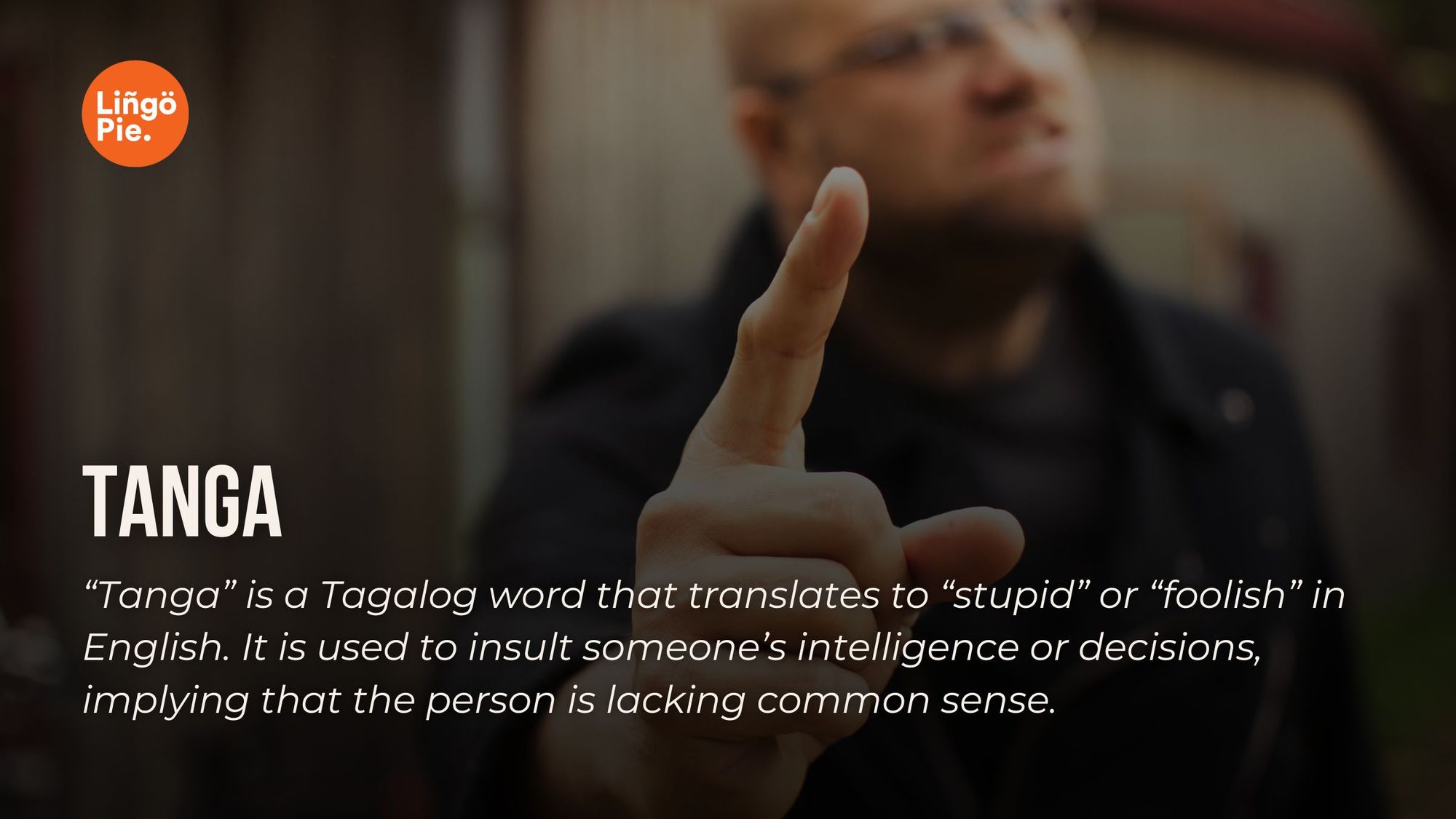
“Tanga” is a Tagalog word that translates to “stupid” or “foolish” in English. It is used to insult someone’s intelligence or decisions, implying that the person is lacking common sense or understanding. Just a warning though, this term is highly offensive and should be used with caution, as it can hurt or provoke the person being called “Tanga.”
Gago / Gaga
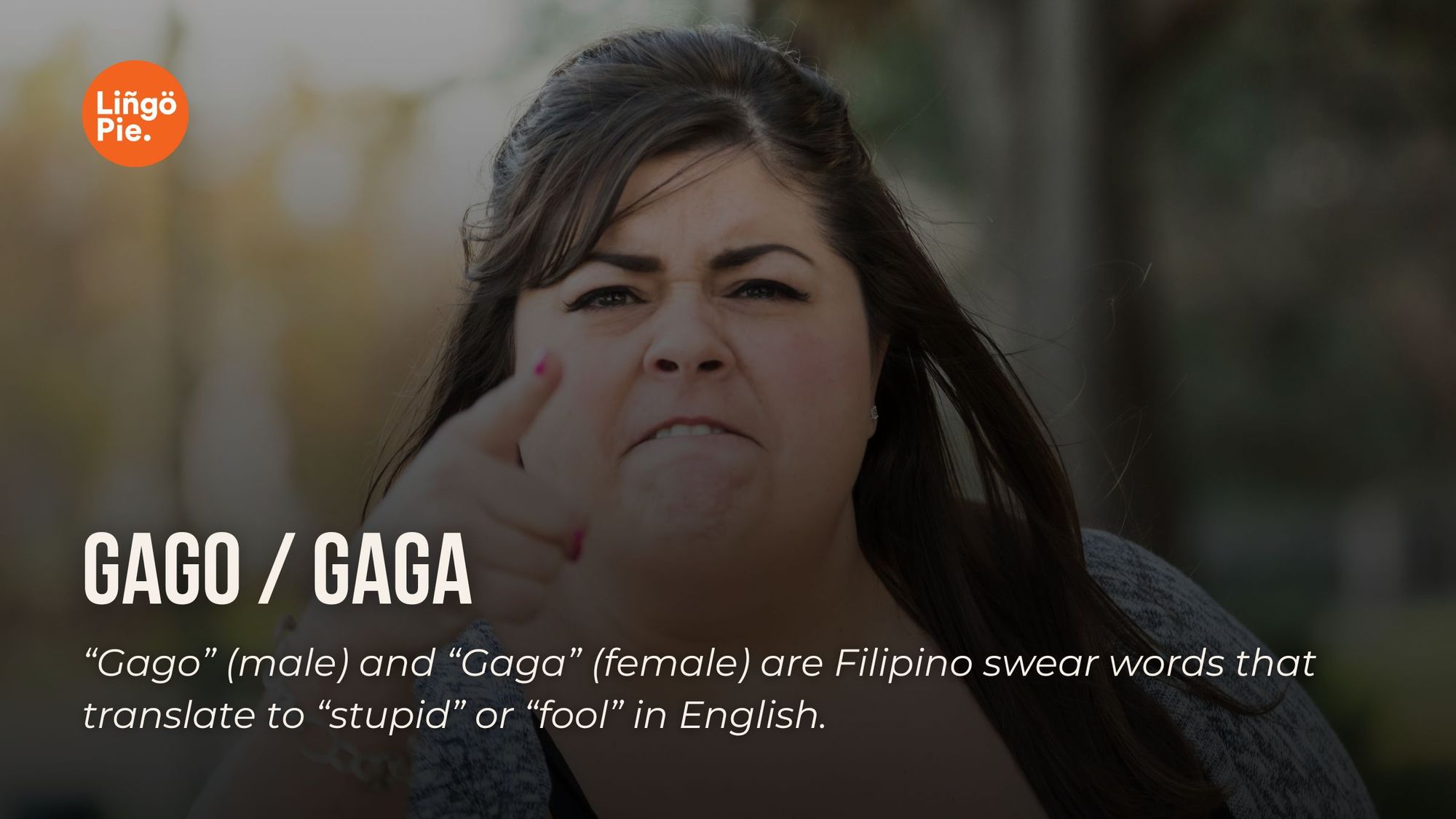
“Gago” (male) and “Gaga” (female) are Filipino swear words that translate to “stupid” or “fool” in English. These words are used to insult someone’s intelligence or actions, implying that the person is acting foolishly or senselessly. Both terms are highly offensive and can provoke strong reactions, so they should be used with extreme caution.
Tangina Mo / Tang Ina Mo
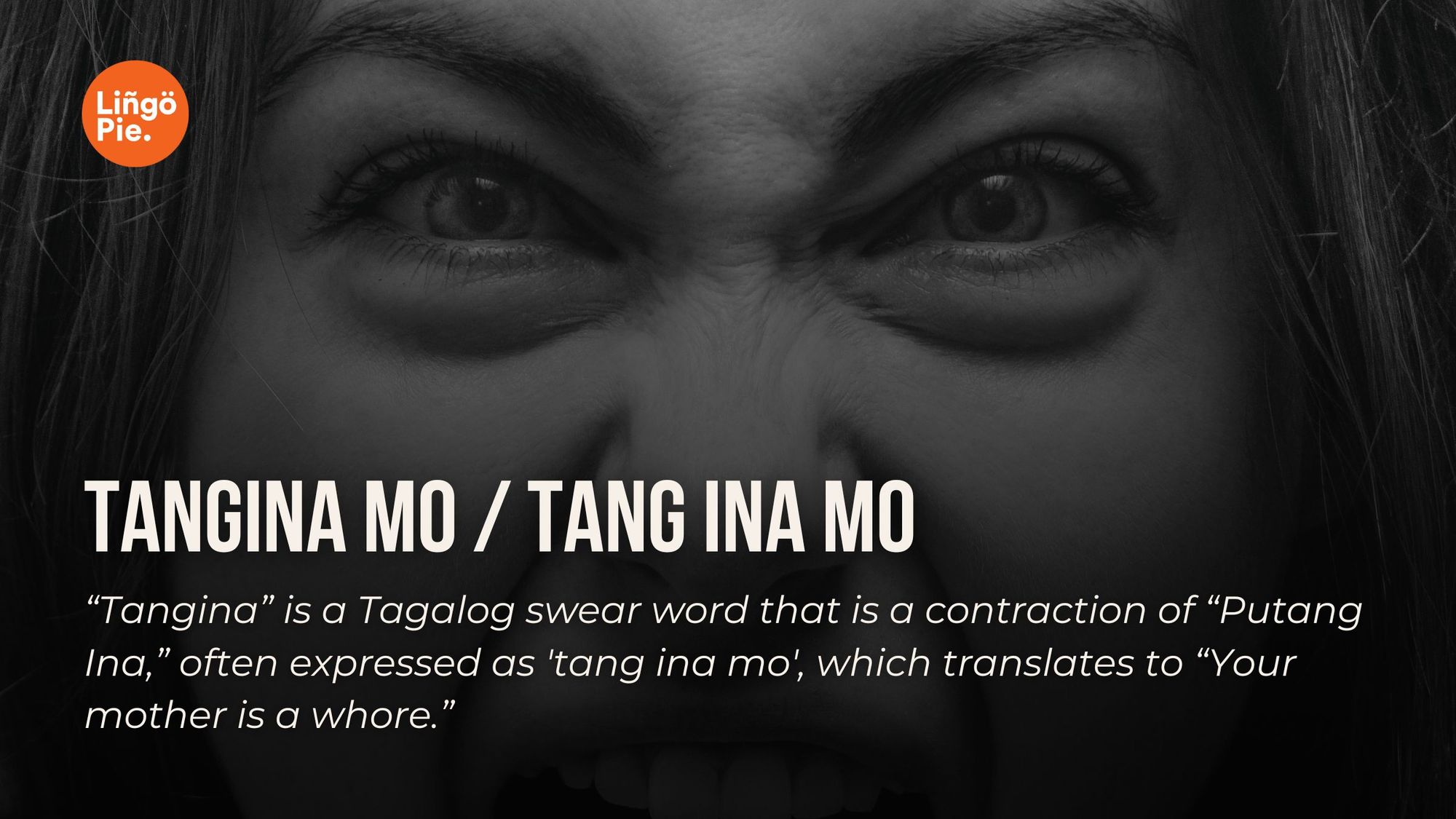
“Tangina” is a Tagalog swear word that is a contraction of “Putang Ina,” often expressed as 'tang ina mo', which translates to “Your mother is a whore.” It is an extremely offensive phrase used to express intense anger, frustration, or disdain.
Puta
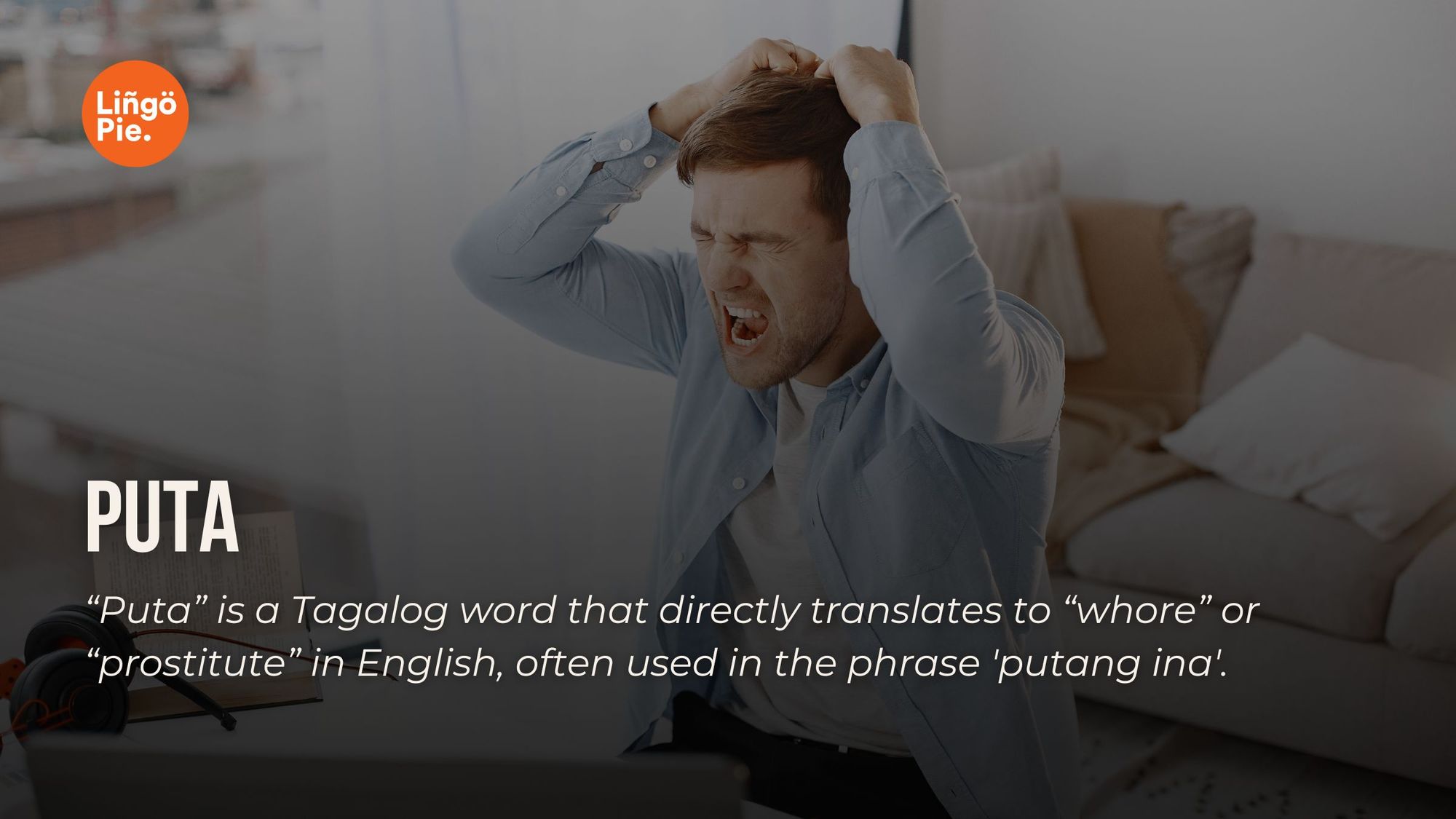
“Puta” is a Tagalog word that directly translates to “whore” or “prostitute” in English, often used in the phrase 'putang ina'. It is a highly offensive term used to insult someone’s character by implying they are immoral or sexually promiscuous.
As a Filipino, I need to warn you that this word carries a strong negative connotation and is considered extremely vulgar in Filipino culture.
Bobo / Boba
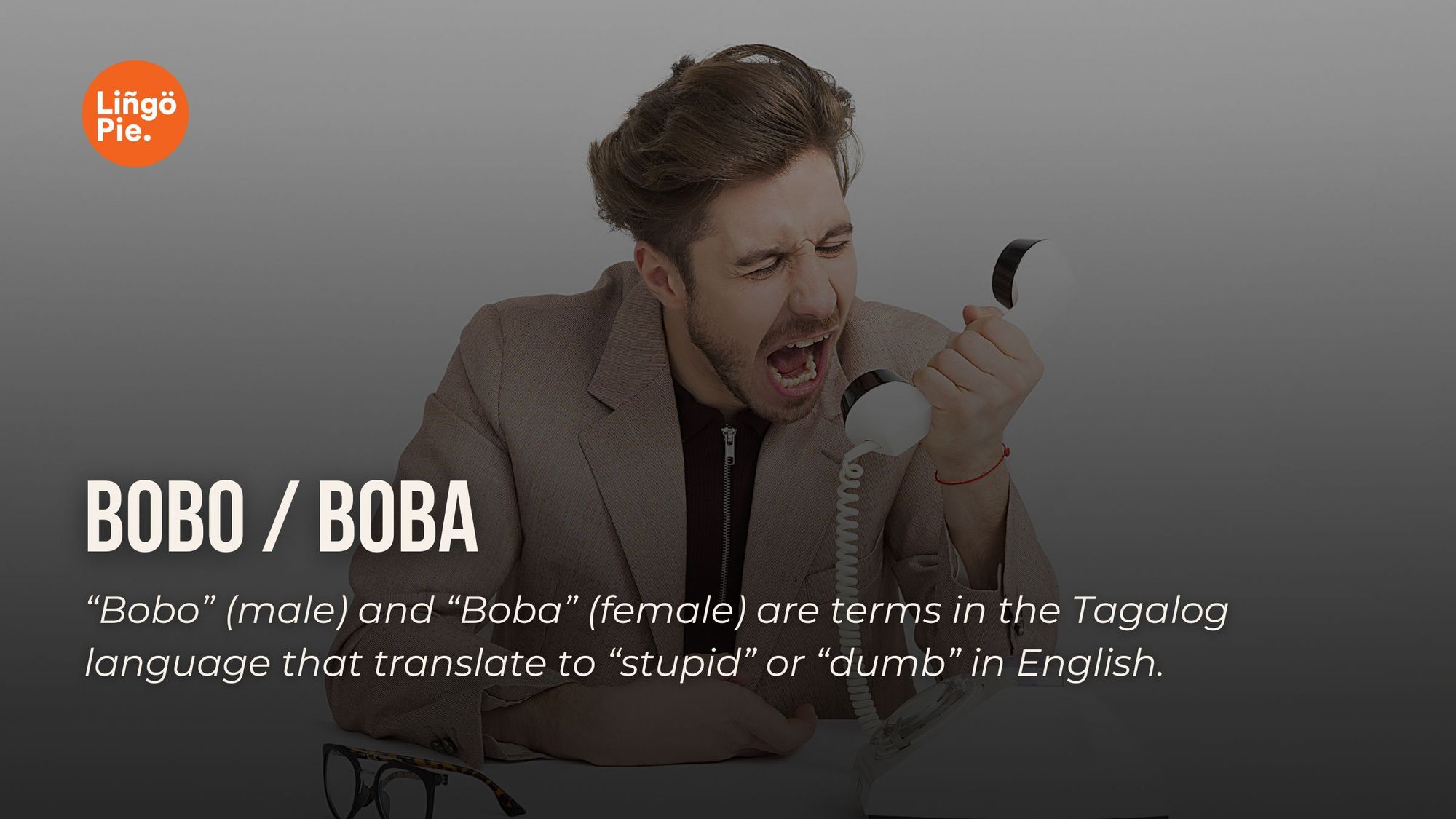
“Bobo” (male) and “Boba” (female) are terms in the Tagalog language that translate to “stupid” or “dumb” in English. These words are used to insult someone’s intelligence, suggesting they are slow-witted or lacking in understanding.
Buang
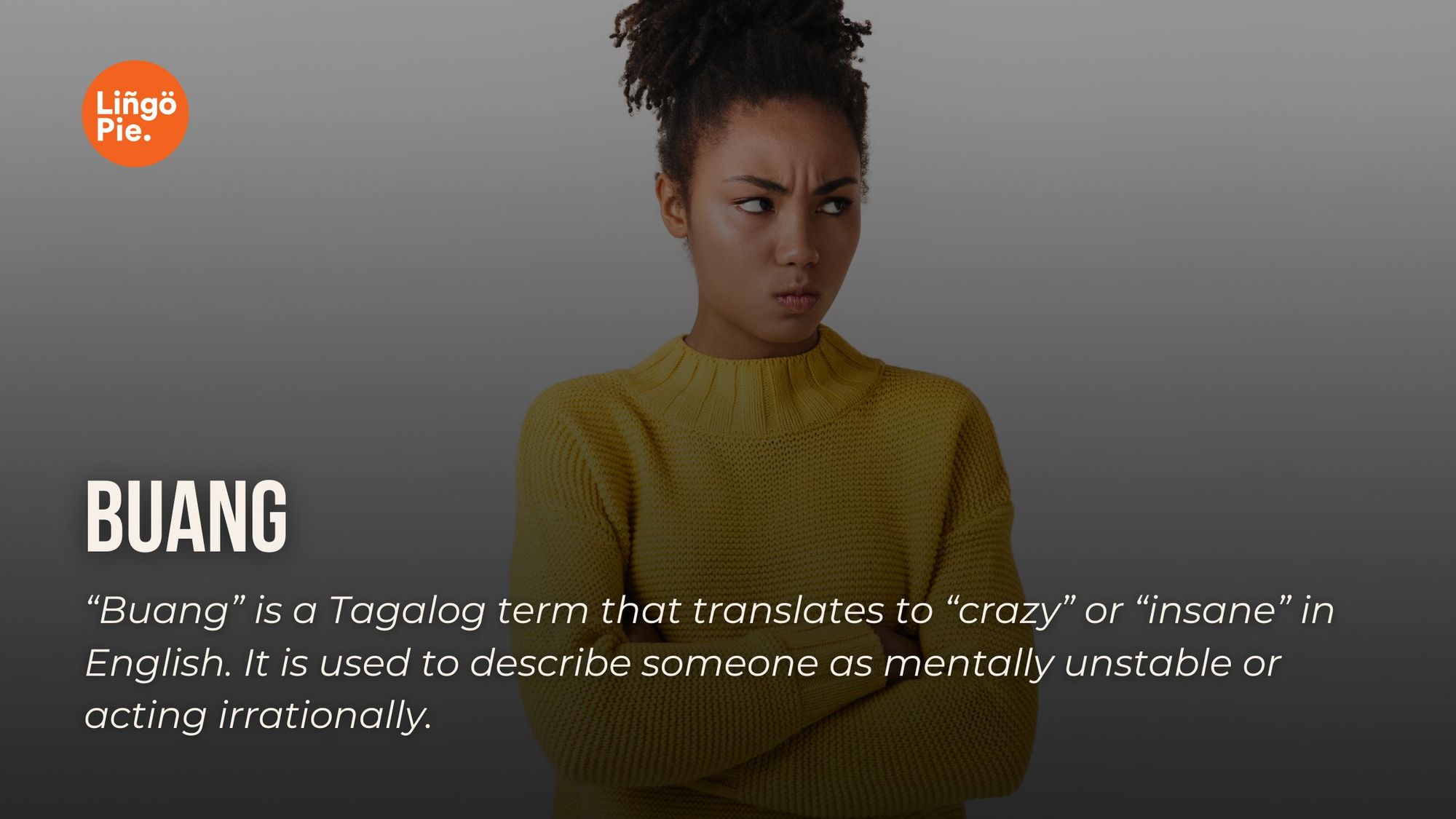
“Buang” is a Tagalog term that translates to “crazy” or “insane” in English. It is used to describe someone as mentally unstable or acting irrationally. In Filipino culture, calling someone “Buang” is highly offensive and stigmatizing, as it trivializes mental health issues and can deeply hurt the person being labeled.
The tricky thing about this term is that it carries a strong negative connotation to the point that it can lead to social exclusion or conflict, similar to 'sira ulo ka'.
Putragis

“Putragis” is a Tagalog expletive that is a milder derivative of “Putang Ina,” often used to express frustration, annoyance, or surprise. It translates more closely to “darn it” or “dang it” in English.
While less offensive than its origin, it still carries a negative tone and can be considered disrespectful if used inappropriately. In Filipino culture, using “Putragis” casually among friends might be acceptable, but it is best avoided in formal or respectful settings, much like other Tagalog bad words.
Hayop Ka
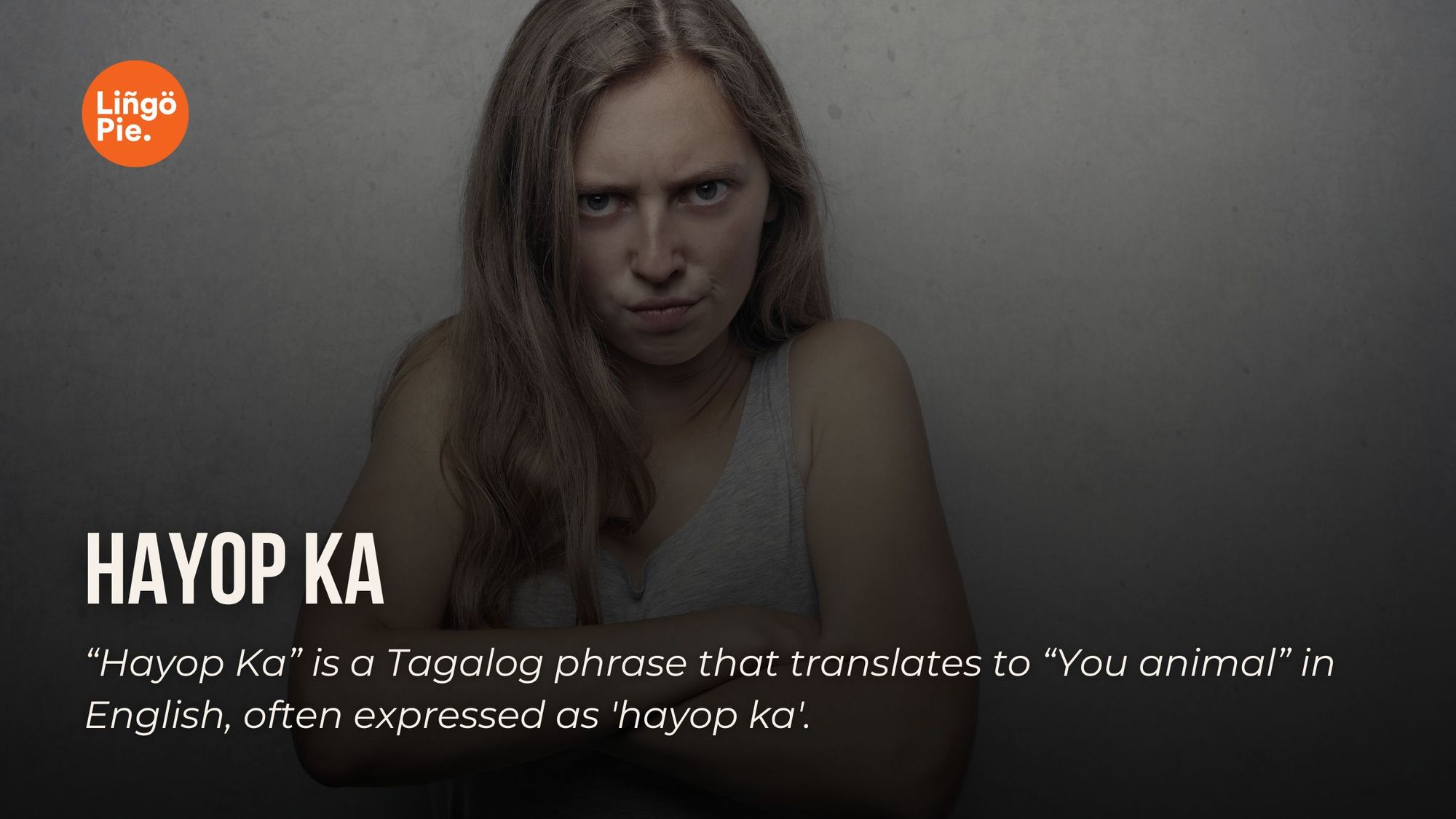
“Hayop Ka” is a Tagalog phrase that translates to “You animal” in English, often expressed as 'hayop ka'. It is used to insult someone by implying they are behaving in a savage, inhuman, or extremely disrespectful manner. In Filipino culture, this phrase is highly derogatory and is typically reserved for grave offenses such as cheating in relationships, betrayal, or acts of extreme cruelty.
Batugan
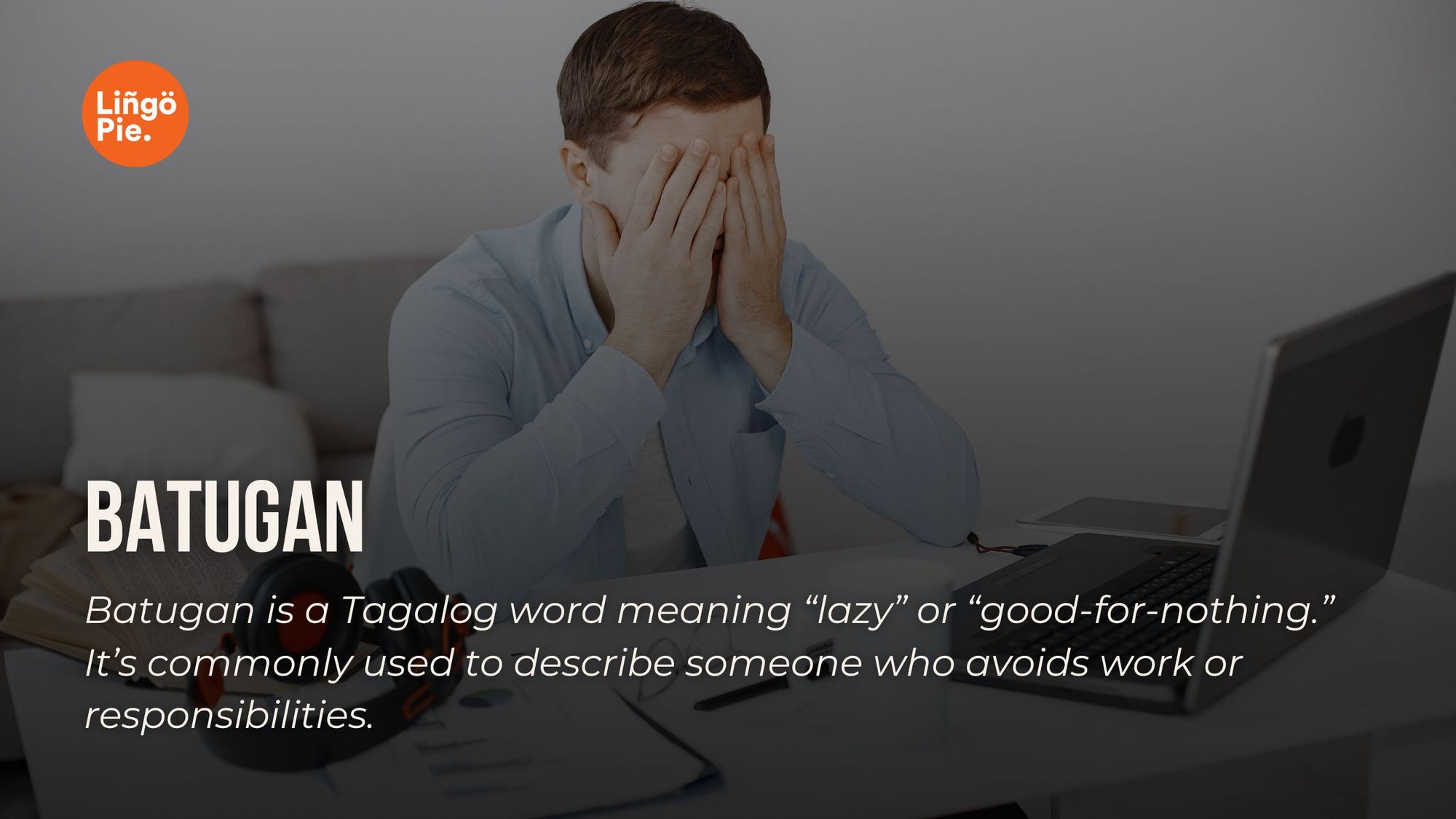
Batugan is a Tagalog word meaning “lazy” or “good-for-nothing.” It’s commonly used to describe someone who avoids work or responsibilities. While this is a harsh criticism to use, what I personally love about this Tagalog swear word is that it shows our society’s emphasis on diligence and contribution to family and community, unlike 'wala kang kwenta'.
Lintik
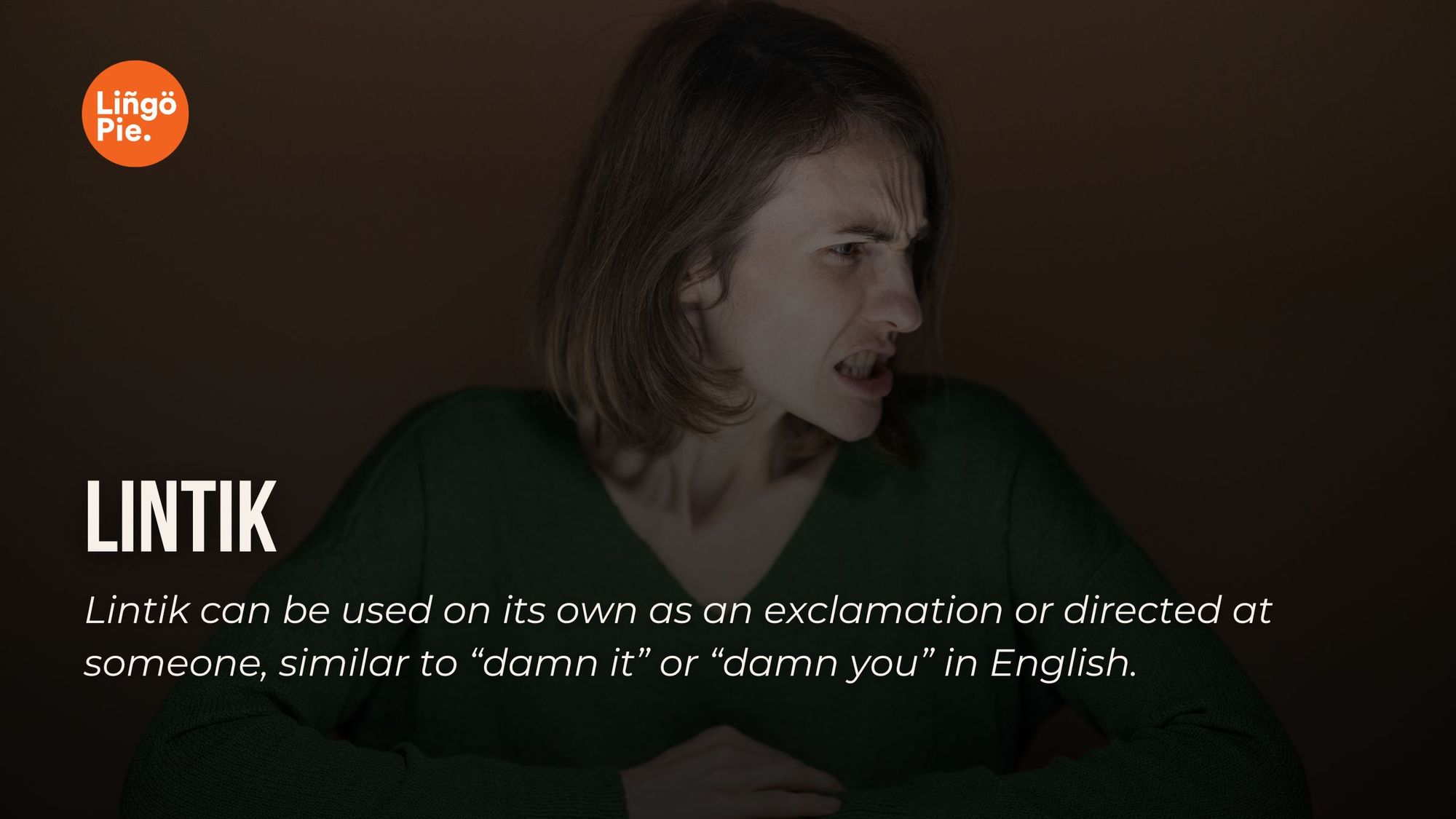
While less offensive than some other swear words, “lintik” is still considered impolite in formal settings. Basically, this term can be used on its own as an exclamation or directed at someone, similar to “damn it” or “damn you” in English. Its usage reflects the Filipino tendency to draw curse words from nature, much like 'mga punyeta kayo'.
Putik / Potek
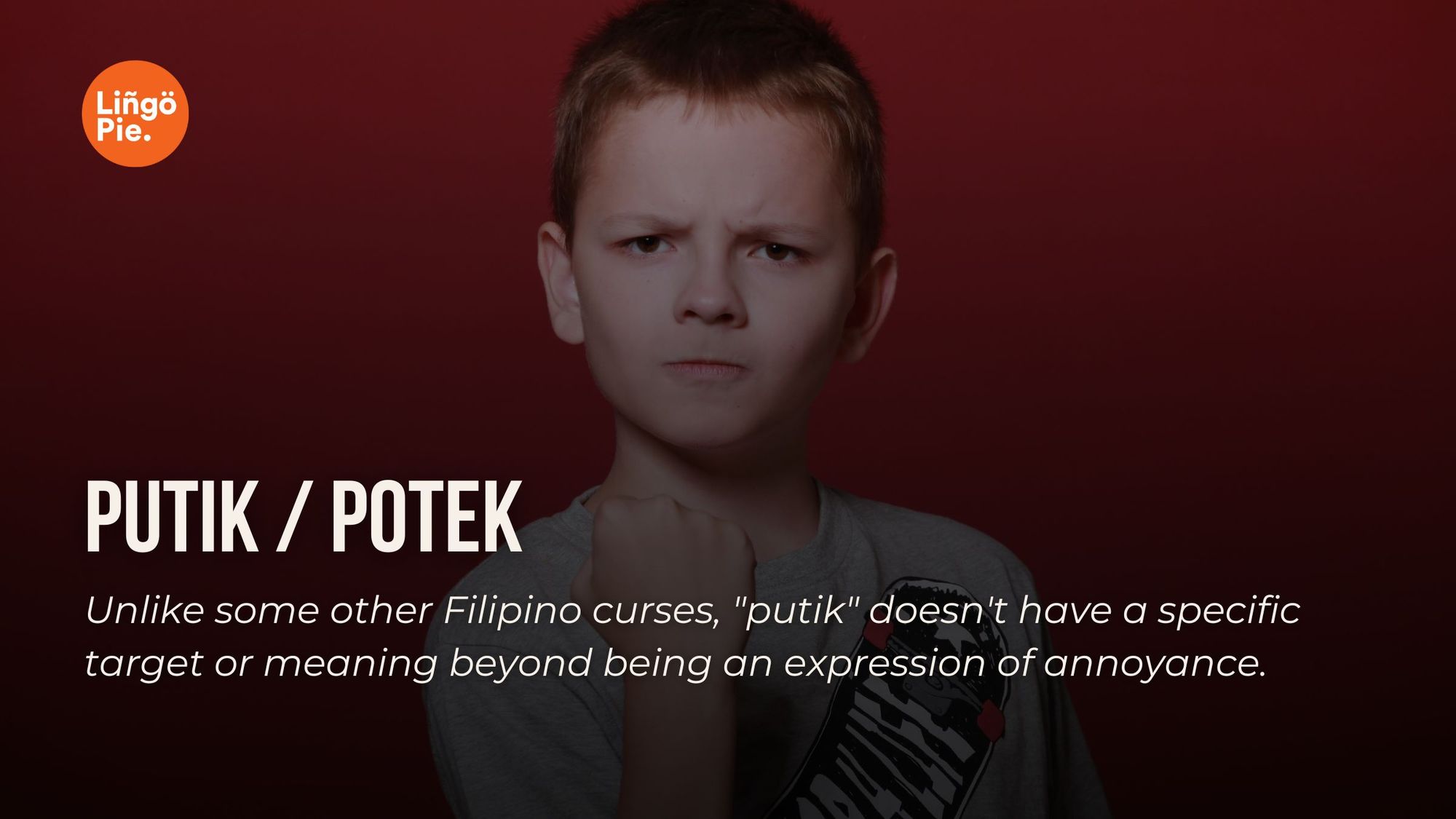
Putik or Potek is a mild Tagalog expletive derived from the word for "mud." It's commonly used as a substitute for stronger swear words, particularly in situations where one wants to express frustration without being too offensive.
Unlike some other Filipino curses, "putik" doesn't have a specific target or meaning beyond being an expression of annoyance. It's often used by people trying to curb their language, similar to saying "sugar" instead of stronger words in English.
Sira Ulo Ka

Literally translated, "sira" means broken, "ulo" means head, and "ka" means you, this Filipino swear word means "you're crazy" or "you're out of your mind." It's often used to express disbelief at someone's actions or ideas, ranging from playful teasing to genuine frustration.
Wala Kang Kwenta
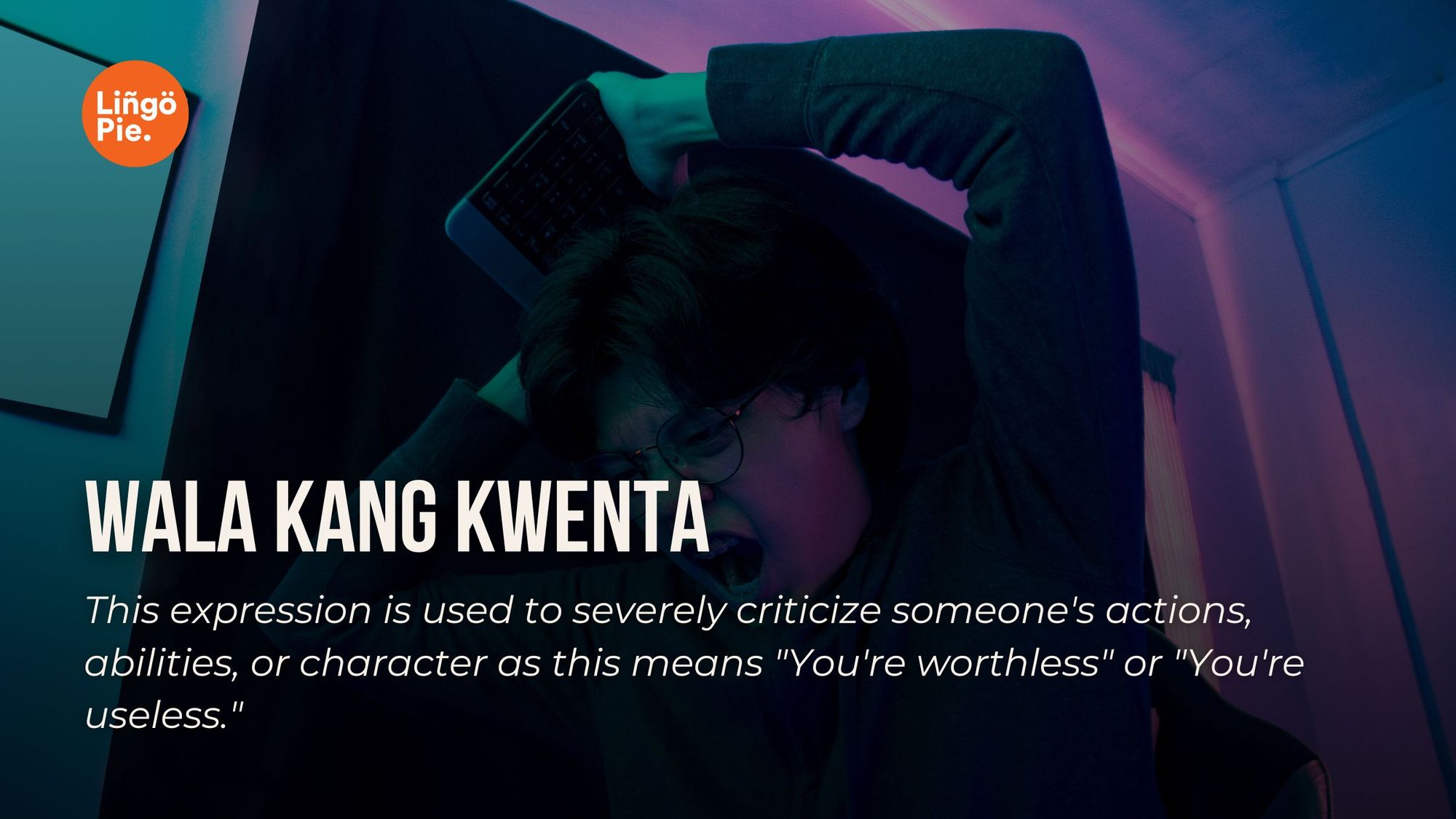
This expression is used to severely criticize someone's actions, abilities, or character as this means "You're worthless" or "You're useless." It's considered a serious insult and is typically used in anger or during intense arguments. While not strictly a swear word, it's highly offensive and should be avoided in most situations.
Syet / Shet
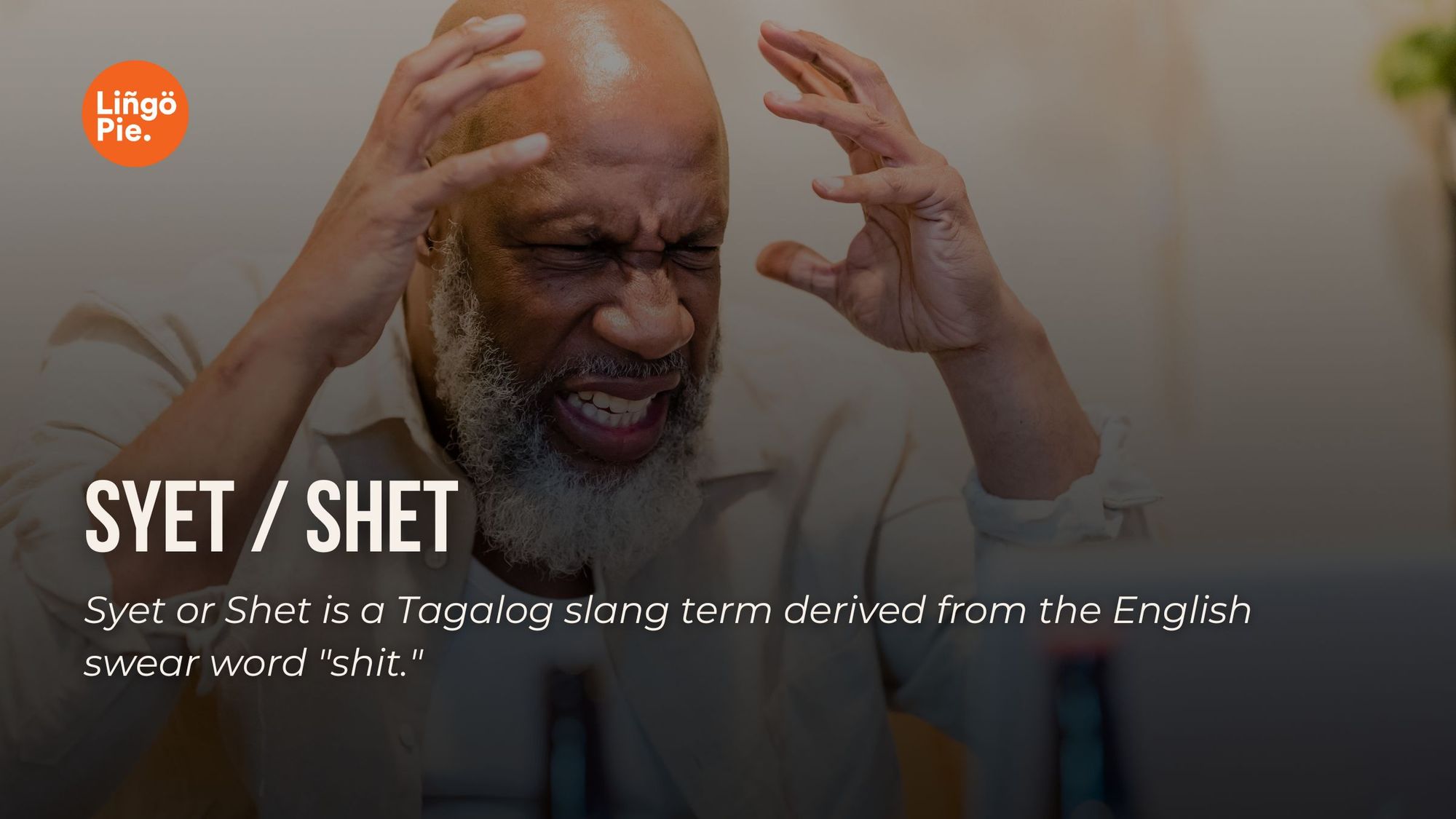
Syet or Shet is a Tagalog slang term derived from the English swear word "shit." It's a milder, more socially acceptable version used to express frustration, surprise, or disappointment. Technically, it's considered less offensive than its English counterpart and is often used in casual conversations among friends or in pop culture.
Ulol
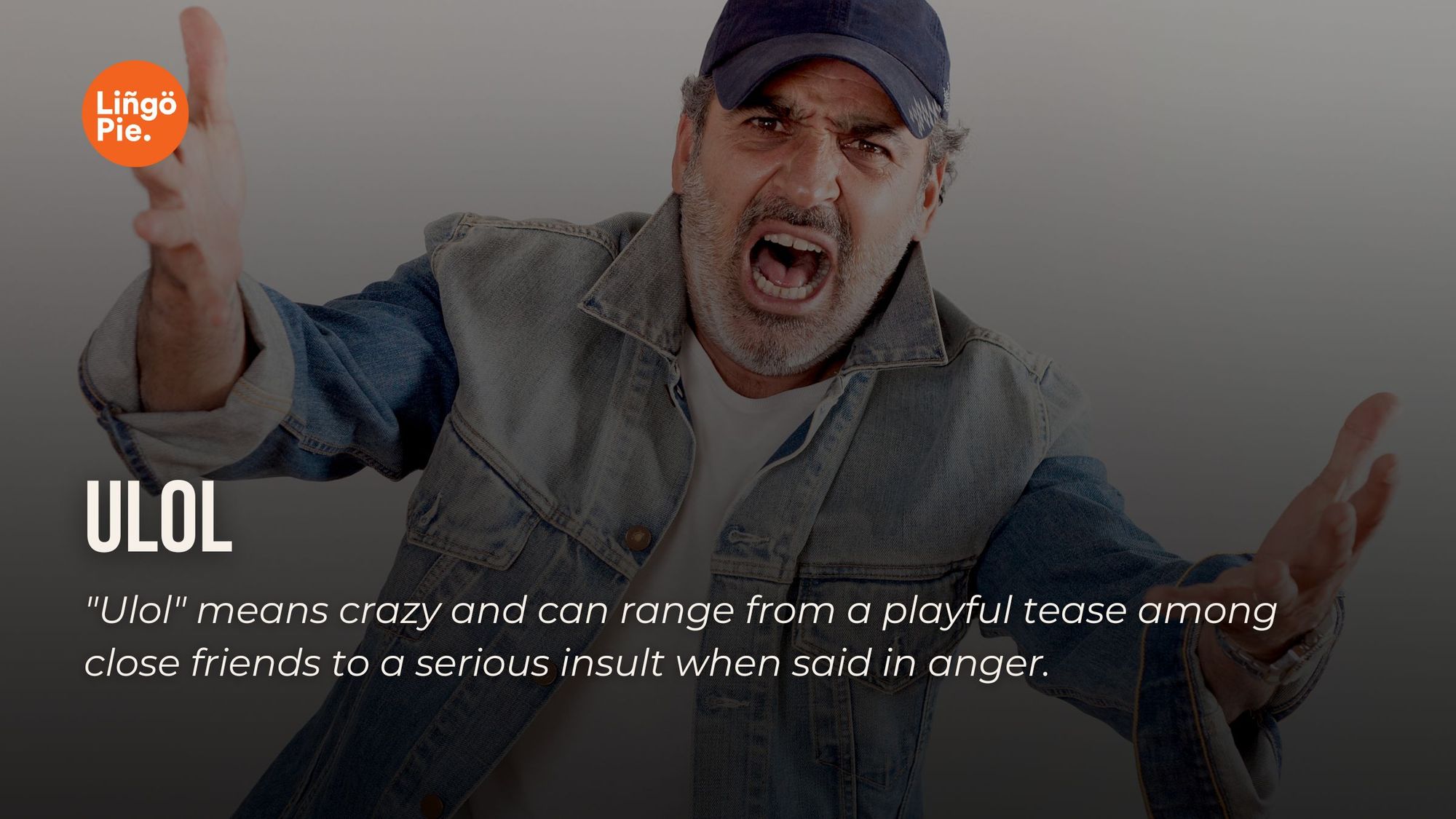
"Ulol" can range from a playful tease among close friends to a serious insult when said in anger. It's more offensive than milder terms like "sira ulo" but less severe than explicit swear words. While common in casual speech, it's considered impolite in formal settings or when addressing strangers.
Kupal

In Tagalog, "Kupal" is a harsh insult comparable to calling someone a "jerk" or "scumbag" in English. Its literal meaning refers to a bodily secretion, adding to its vulgarity. Filipinos use this term to describe someone behaving in an extremely unpleasant or despicable way.
Hudas

Hudas, derived from the biblical figure Judas Iscariot, is a Tagalog insult meaning "traitor" or "backstabber." When someone's labeled as "Hudas," you now know that it's a scathing accusation of disloyalty or betrayal. While not explicitly a swear word, its use can be just as impactful.
Leche
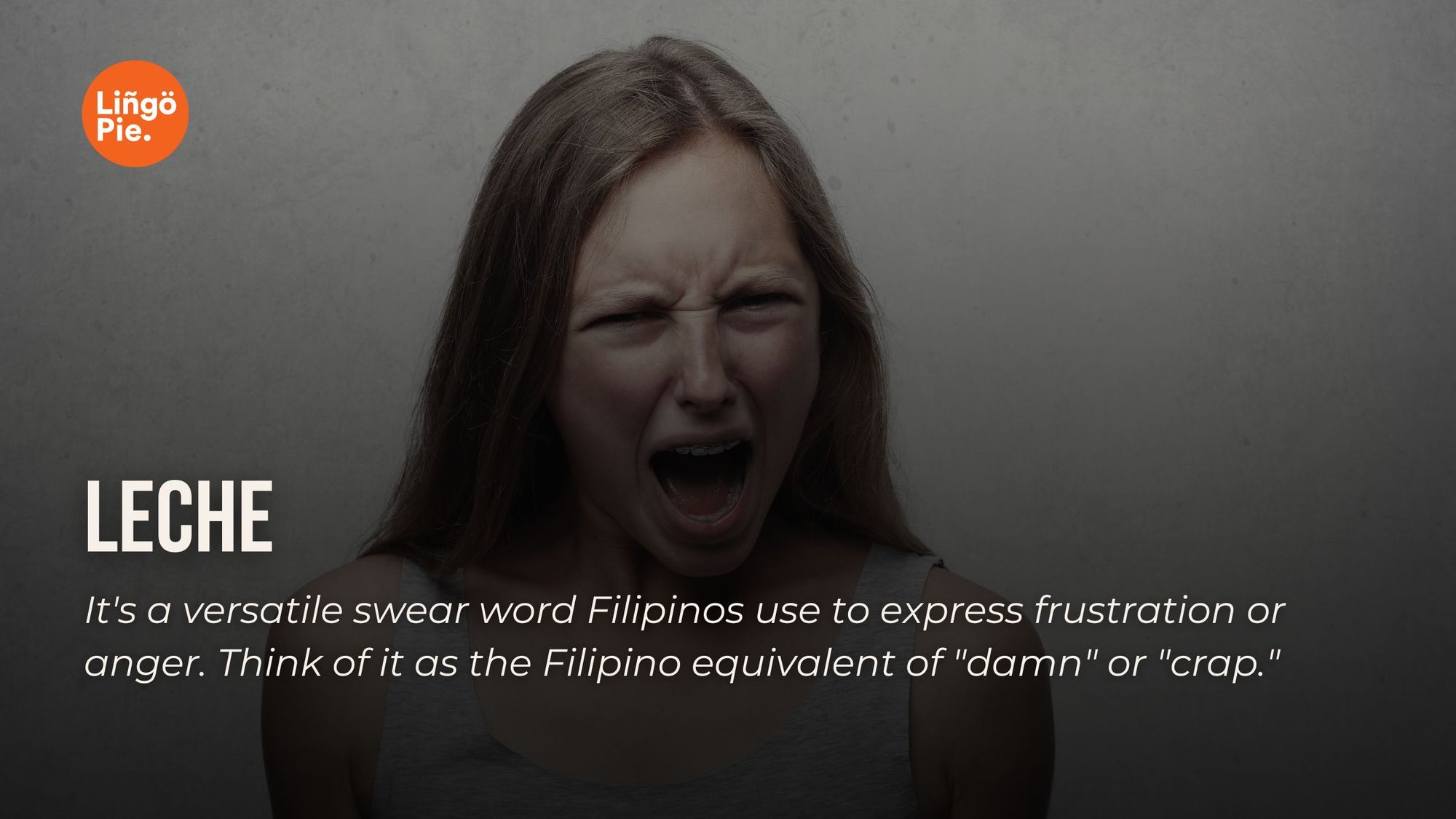
Leche, borrowed from the Spanish word for "milk," has taken on a completely different meaning in Tagalog. It's a versatile swear word Filipinos use to express frustration or anger. Think of it as the Filipino equivalent of "damn" or "crap."
While not the strongest curse word, it's definitely not polite conversation. You might hear it when someone stubs their toe or gets stuck in traffic. It can be used alone as an exclamation or directed at someone who's annoying you.
Burat
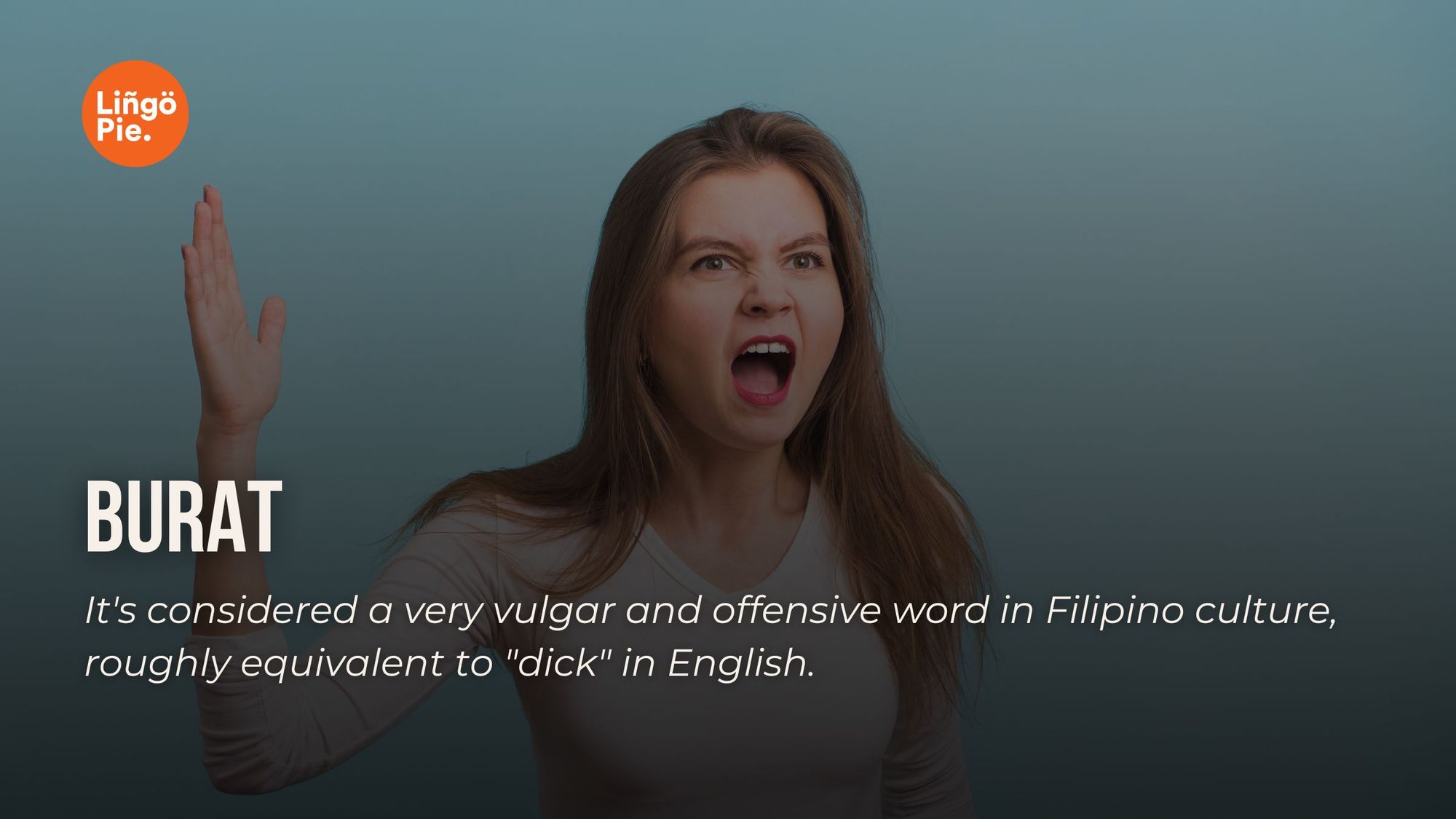
"Burat" is a crude Tagalog term for the male genitalia. It's considered a very vulgar and offensive word in Filipino culture, roughly equivalent to "dick" in English, but often perceived as even stronger.
Mga Punyeta Kayo / Punyeta Ka
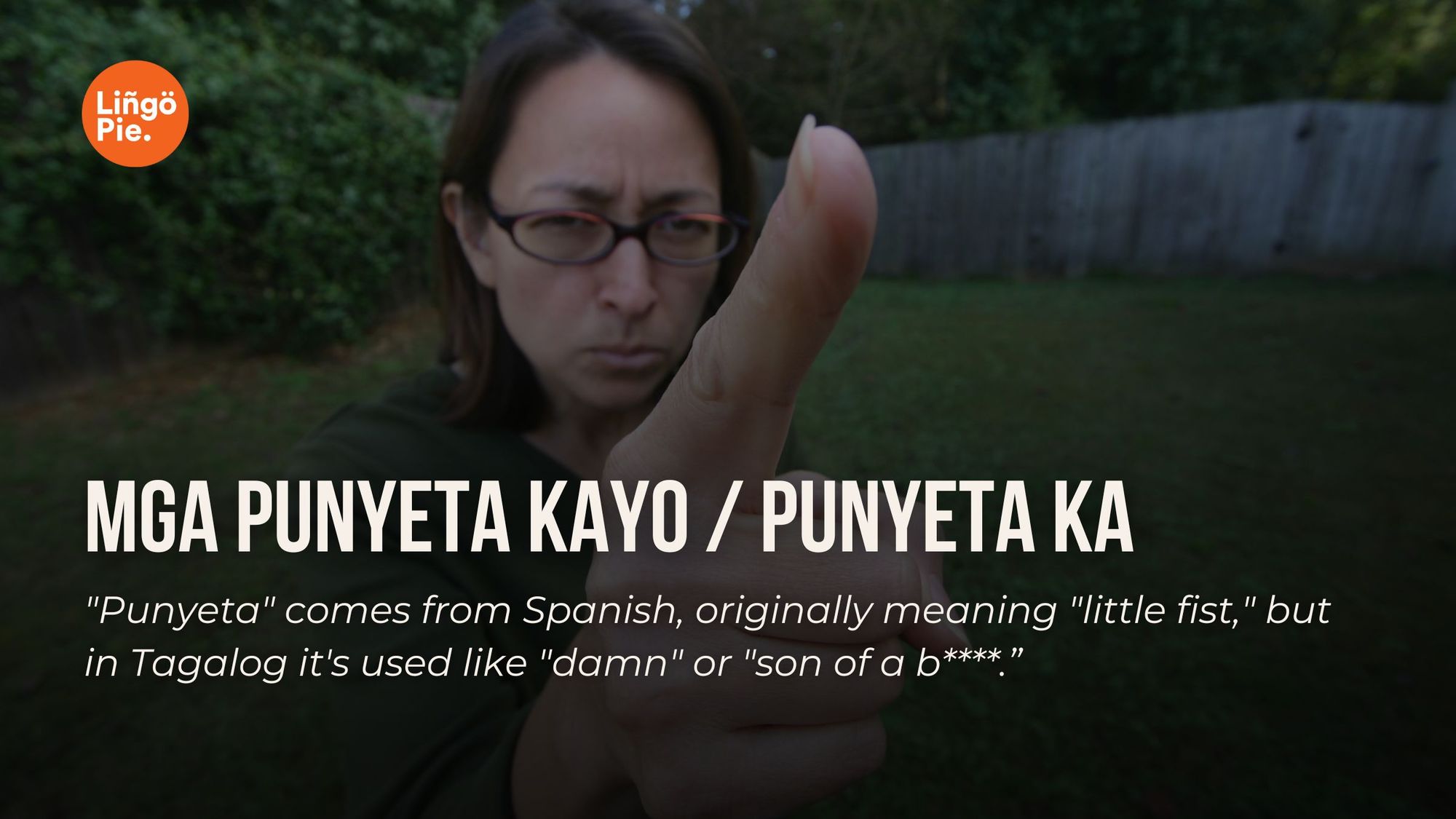
"Mga Punyeta Kayo" (plural) or "Punyeta Ka" (singular) is a strong Tagalog curse phrase. "Punyeta" comes from Spanish, originally meaning "little fist," but in Tagalog it's used like "damn" or "son of a b****."
When you add "Mga" (plural marker) and "Kayo" (you all) or "Ka" (you), it becomes a direct insult: "You're all damned" or "You're damned."
Filipinos might use this when extremely angry or frustrated with people. It's definitely not for polite company - you won't hear it in formal settings or family gatherings (unless things go really wrong).
Tarantado
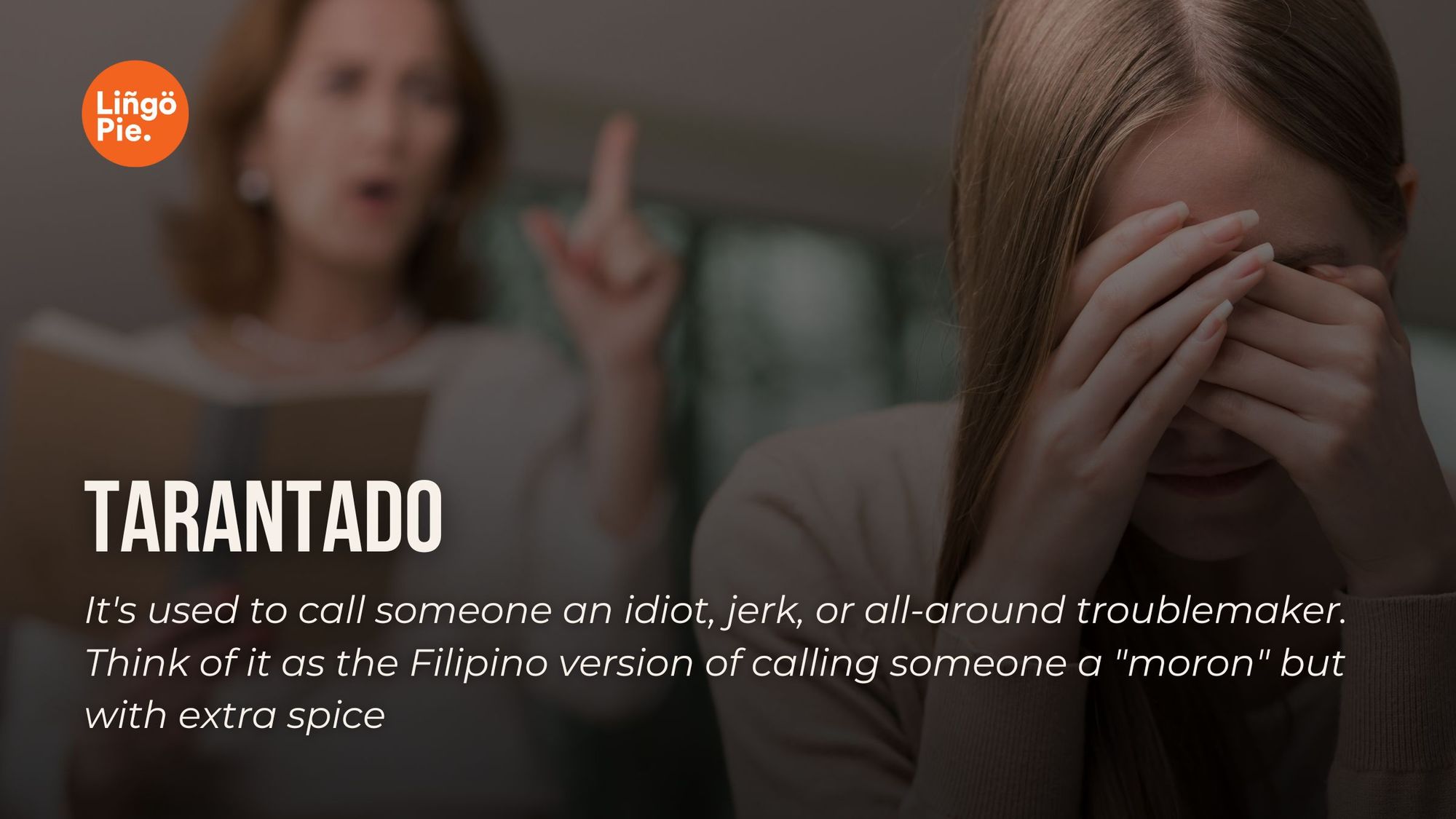
It's used to call someone an idiot, jerk, or all-around troublemaker. Think of it as the Filipino version of calling someone a "moron" but with extra spice. You might hear "Tarantado!" yelled at bad drivers or used to criticize someone's ridiculous behavior.
Ungas

Ungas is a Tagalog insult that's like calling someone a dimwit or a bonehead. It's not the harshest swear word out there, but it's definitely not a compliment.
Imagine you're watching your friend try to open a door by pushing when there's a big "PULL" sign. That's when you might hear someone mutter "Ungas!" under their breath.
This word is pretty versatile. It can be a playful jab between friends or a more serious insult when you're really frustrated with someone's actions. You won't hear it in formal speeches or polite company, but it's common in casual conversations and arguments.
Hinayupak
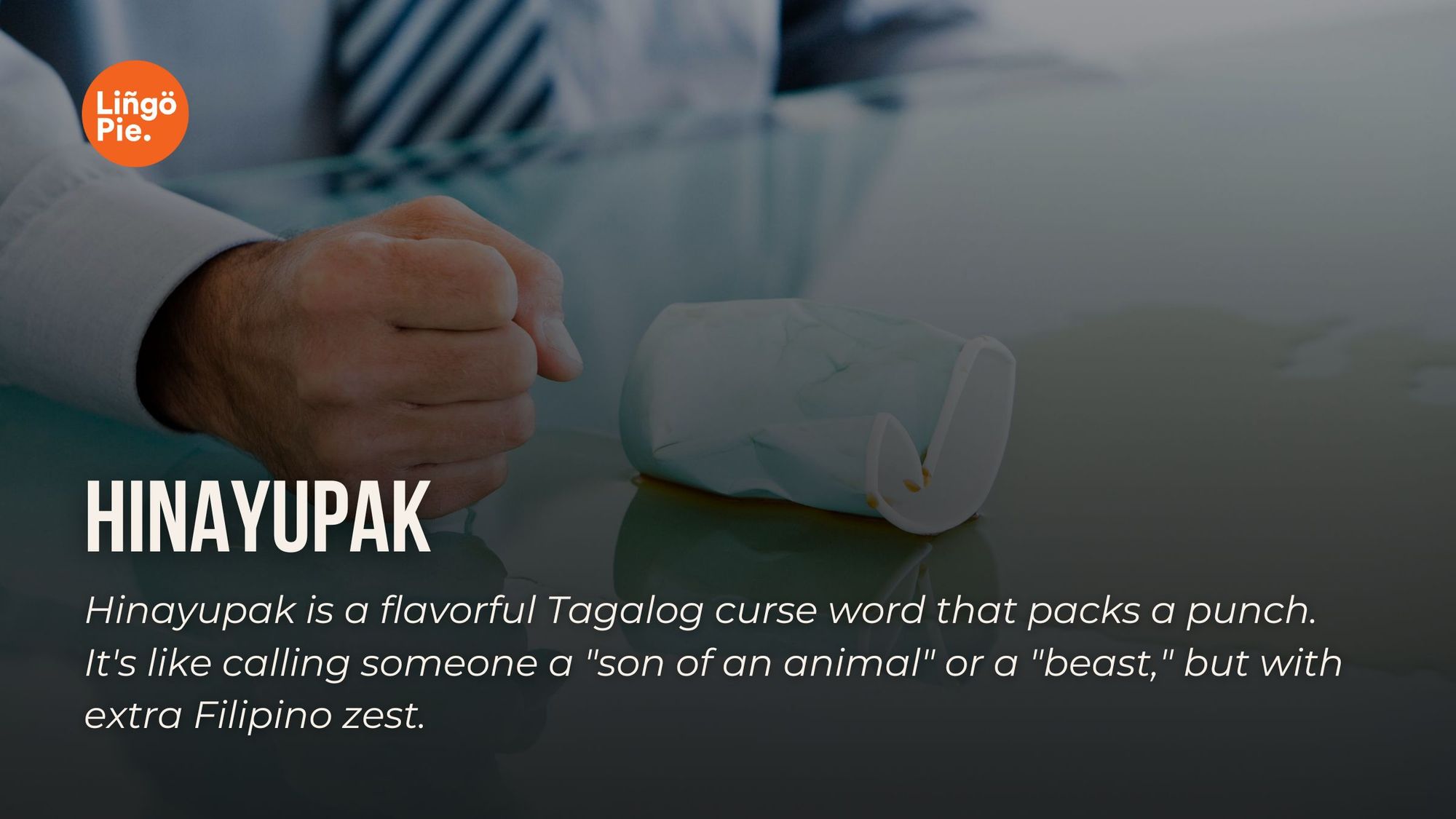
Hinayupak is a flavorful Tagalog curse word that packs a punch. It's like calling someone a "son of an animal" or a "beast," but with extra Filipino zest. While it's not the most extreme swear word, it's still pretty harsh. Think of it as a step up from calling someone crazy, but not quite as bad as some other Filipino curses.
Pucha
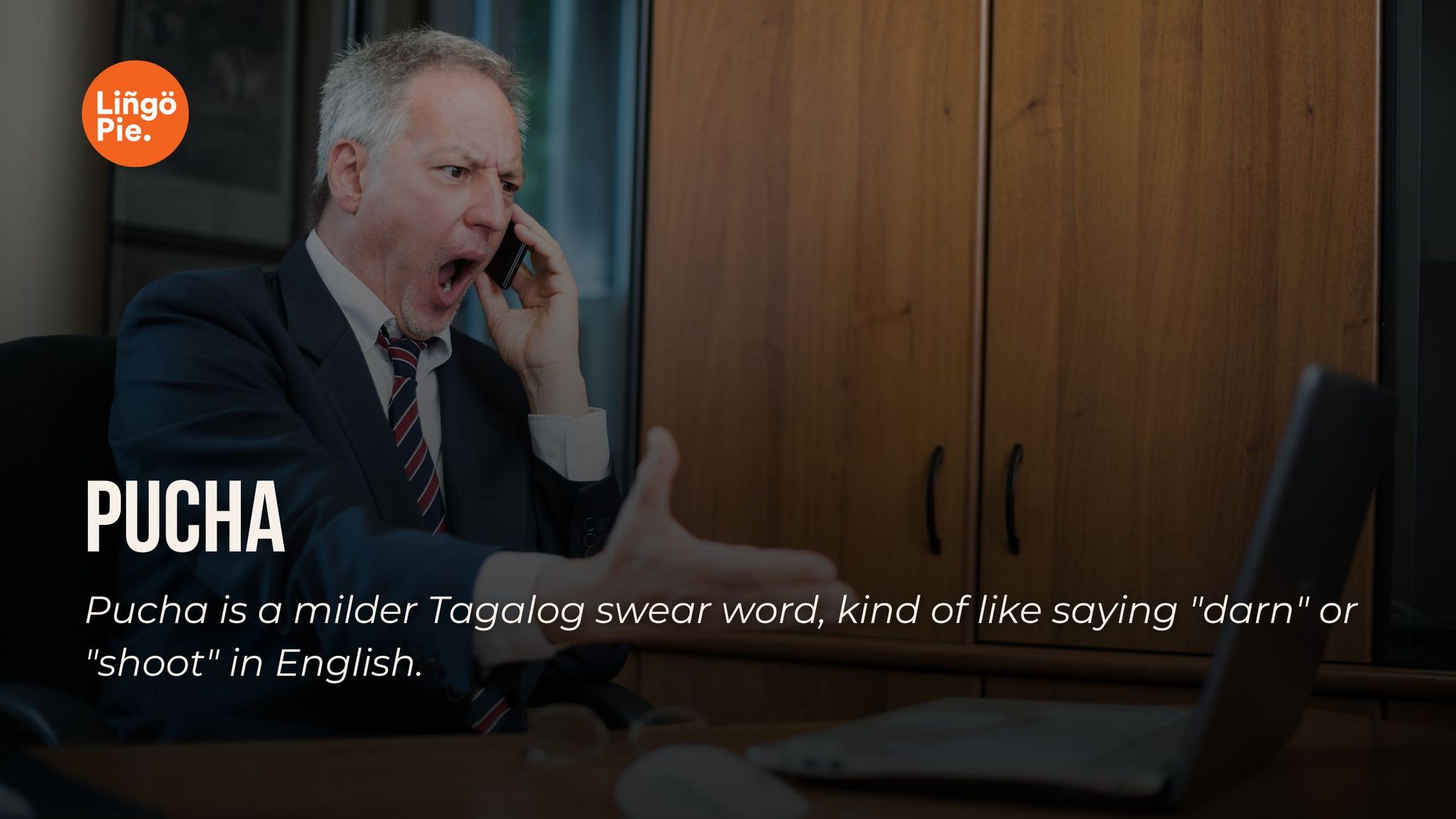
Pucha is a milder Tagalog swear word, kind of like saying "darn" or "shoot" in English. It's the toned-down cousin of stronger curses, making it more socially acceptable in casual settings.
This word likely evolved from the Spanish "puta" (a strong profanity), but Filipinos have softened it for everyday use. You'll hear "Pucha!" when someone's frustrated or surprised, but not furious enough for heavier swears.
Pesteng Yawa

Pesteng Yawa is a colorful Visayan expression that's made its way into Tagalog. It's like a double whammy of frustration, combining "peste" (pest) and "yawa" (devil). You might hear "Pesteng yawa!" when someone's computer crashes or they burn their dinner. It's too strong for formal settings but common in casual talk, especially in the Visayas and among Tagalog speakers with Visayan connections.
Pakshet
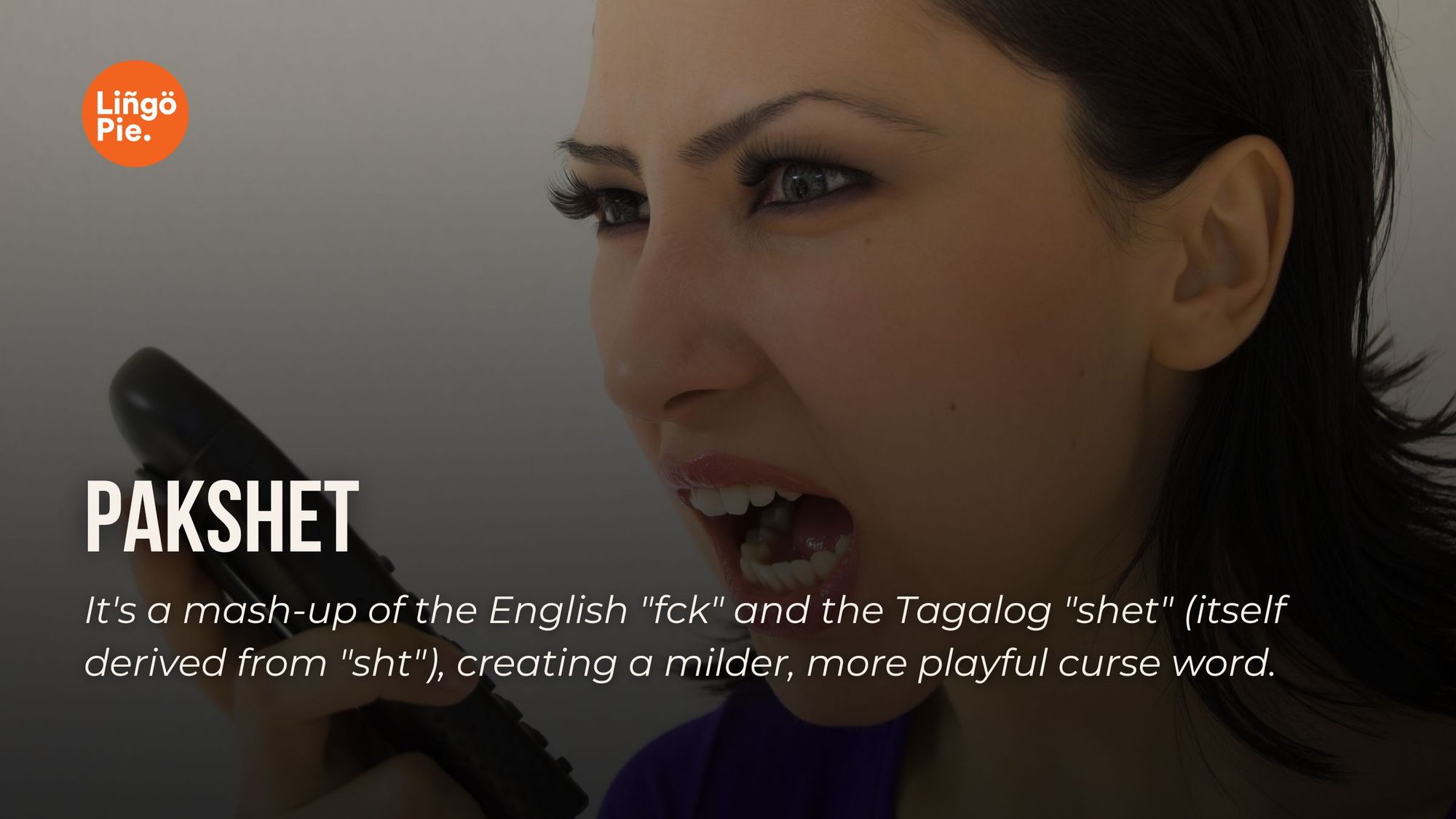
Pakshet is a uniquely Filipino twist on swearing that blends English and Tagalog. It's a mash-up of the English "fck" and the Tagalog "shet" (itself derived from "sht"), creating a milder, more playful curse word. It's the go-to expletive for Filipino youth and young adults, often peppered through casual conversations or social media posts.
Pakyu Ka

"Pakyu ka" is a Tagalog insult that's essentially the Filipino way of saying "F*ck you." It's a prime example of how English profanity gets a local makeover in Philippine slang. This phrase combines "Pak," a shortened version of the English F-word, with "yu" (you) and "ka" (Tagalog for "you"). It's like English swearing put through a Filipino filter.
Puke Ng Ina Mo

This phrase is an extremely vulgar and disrespectful insult in Filipino culture, involving a person's mother in a highly inappropriate way. Why? Well, this literally translates to "your mother's vagina!"
Supot

"Supot" in Tagalog literally means "plastic bag," but it's also used as a crude insult. It refers to an uncircumcised male, which in Filipino culture can be seen as a jab at someone's masculinity.
This term reflects the cultural importance of circumcision in the Philippines, where it's often considered a rite of passage for boys. Calling someone "supot" implies they're immature or not fully a man.
Kainin Mo Tae Ko

"Kainin mo tae ko" is an extremely vulgar and offensive phrase in Tagalog. It involves a graphic reference to bodily waste and is considered one of the most disrespectful things you can say to someone in Filipino culture.
Animal Ka
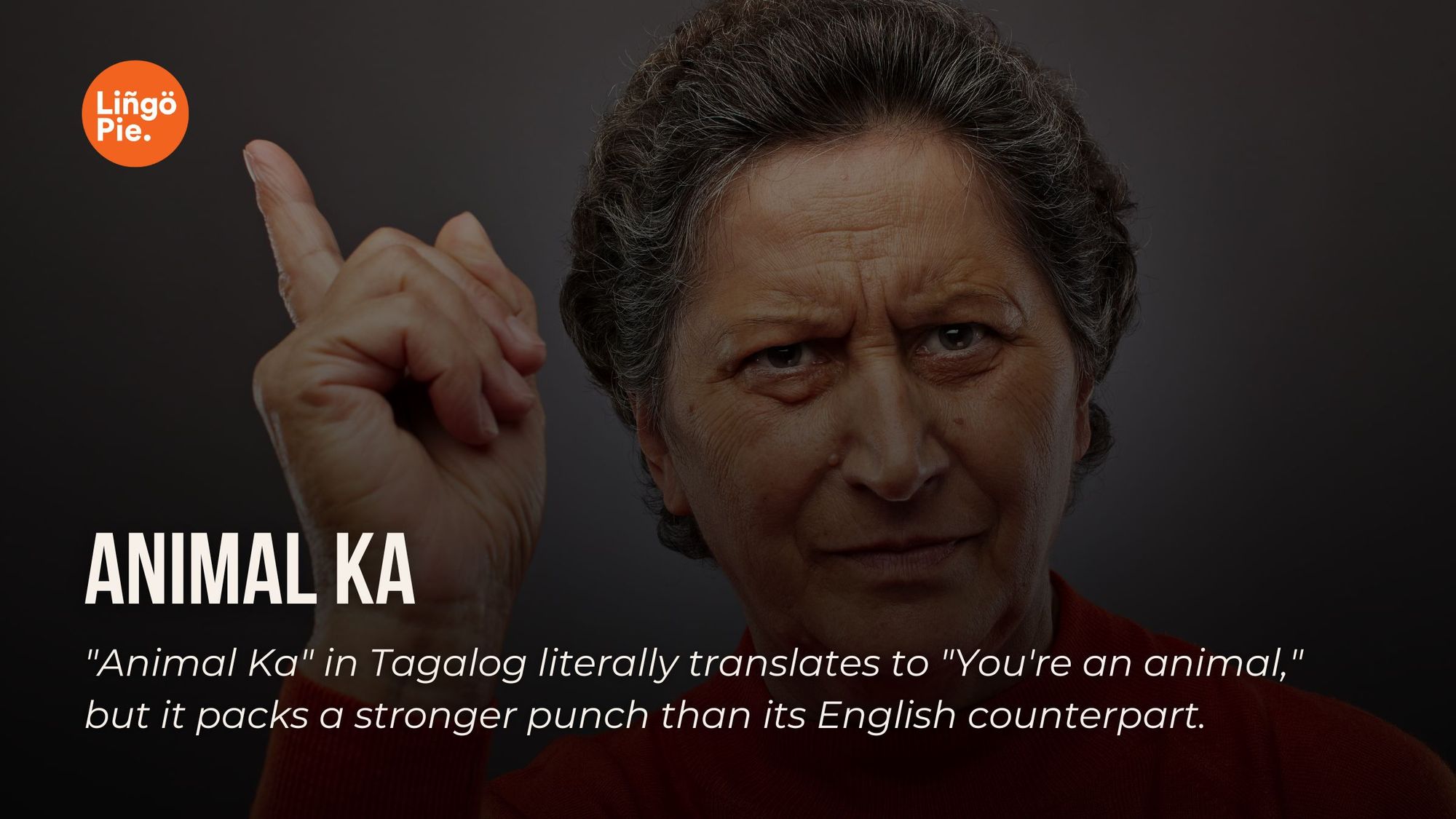
Tired of saying "hayop ka?" Then meet your new favorite curse word in the Tagalog language: Animal ka! "Animal Ka" in Tagalog literally translates to "You're an animal," but it packs a stronger punch than its English counterpart. This insult is used to call someone uncivilized, brutish, or lacking human decency.

Tagalog Exclamations That Sound Way Worse Than They Are
Alright, now that you've learned all those actual Tagalog curse words, let's talk about the ones that'll trick you. There are plenty of Filipino exclamations that sound absolutely scandalous to foreign ears but are actually completely innocent. In this section, let's talk about these Tagalog words often thought of as curse words.
"Ay, naku!"
If you heard someone yell this, you probably thought they just unleashed some serious profanity. Nope! It's literally just "Oh my!" Your sweet Tita says this when she drops her keys, hears juicy gossip, or realizes she forgot to defrost the chicken. Totally harmless, just very Filipino.
"Jusko!"
This one sounds intense because it kinda is, but it's not a curse. Short for "Jesus ko" (my Jesus), it's basically the Filipino "Jesus Christ!" without any actual religious offense. Even church-going grandmothers drop this one regularly.
"Susmaryosep!"
Yeah, this mouthful sounds like someone's having a breakdown, but it's just "Jesus, Mary, Joseph" smooshed together. Pure Catholic-Filipino drama in word form. Use it when life gets ridiculous, which in the Philippines, happens pretty often.
"Grabe!"
Foreigners always think this is some hardcore curse word because of how dramatically Filipinos say it. It just means "intense" or "extreme." "Grabe yung ulan!" (The rain is crazy!) Not a swear, just enthusiasm.
"Hay nako!"
The sound of Filipino exasperation. Not profanity, just the verbal equivalent of throwing your hands up and accepting that this is your life now. Perfect for Manila traffic or when your internet cuts out during an important call.
So yeah, if you've been side-eyeing Filipinos thinking they're constantly cursing - they're probably just being dramatically expressive. Which, to be fair, is pretty much our default setting.
Expand Your Language Skills with Lingopie

Now that you've explored the colorful world of Tagalog expressions, why stop there? There's a whole globe of fascinating languages waiting for you to discover. And guess what? Learning them can be just as entertaining as picking up Filipino slang!
Imagine understanding French pick-up lines in a comedy, or catching the nuances in Spanish telenovelas. With modern language learning platforms like the Lingopie, you can do just that!
Lingopie is a language learning platform that lets you discover new languages through TV shows and movies - it's like a streaming platform, but you're actually leveling up your language skills. Give it a try by signing up for a FREE 7-day trial!







![How To Learn Italian Through The News [ Comprehensive Guide]](/blog/content/images/size/w1200/2024/07/Apprendre-Des-Gros-Mots-Faciles-En-Allemand.png)



